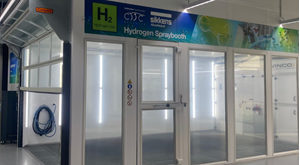News
AkzoNobel installs H2-powered spray booth at new automotive training center
One of the automotive industry’s first hydrogen-powered spray booths has been installed by AkzoNobel at a new training center in Belgium. Located near Brussels, the groundbreaking facility is part of a multi-million-euro program to expand and upgrade the company’s network of more than 40 Automotive Training Centers (ATCs), which are located across the globe.
Designed to go beyond local and legislative requirements, the new spray booth highlights how embracing the latest technologies can contribute to more sustainable operations. The site itself – which is 30% larger than the one it’s replacing – has been constructed to be BREEAM certified, further demonstrating AkzoNobel’s commitment to reducing carbon emissions across the full value chain by 2030.
“The industry of the future requires painters of the future who are fully conversant with the latest technologies and techniques,” says Patrick Bourguignon, Director of the company’s Automotive and Specialty Coatings business. “By increasing the size of our Belgian facility by almost a third, we can accommodate more technology – such as the new spray booth – and train more people.
“We’ll be able to show body shop personnel how the latest technologies can reduce carbon emissions, lower drying times and consume less energy, helping to drive the industry in a more sustainable direction.”
The hydrogen-powered combi spray booth is fully equipped for traditional repairs and includes an all-in-one repairs workstation. It also has a special air filtration system which uses “active carbon” to filter any volatile organic compounds (VOCs) generated during the painting process. An extra HEPA air filtration produces clean air (up to 99%), which is filtered back out into the atmosphere.
A wide range of training programs is offered by the ATCs, including application training, product and system training, and training in new digital color processes. There’s a particular emphasis on quality improvement, process improvement and repairs to radar capable vehicles, as well as the new generation of electric vehicles.
“By further upskilling painters, body shop managers and OEM engineers on a new generation of coatings and technologies, we can help them improve operational efficiency and reduce their own carbon emissions,” adds Bourguignon. “The investments we’re making in our ATCs will therefore address a growing global skills shortage, while also helping us set a new benchmark for sustainable practices in our industry.”
The company’s ATCs are part of a broader global network of training facilities that AkzoNobel operates across its businesses. They support customers and partners across key industries including aerospace coatings, decorative paints and yacht coatings.


